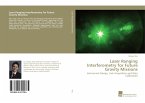This PhD thesis describes the design, construction, and implementation of a Low Energy Ion Source (LEIS) for the ion mode calibration of the two ROSINA mass spectrometers on board ESA's Rosetta spacecraft to comet 67P/Churyumov-Gerasimenko. The low velocity of the ions in the vicinity of the comet as well as the low relative speed between the spacecraft and the comet leads to ion energies of typically less than 20 eV. In combination with spacecraft charging that occurs in such an environment the detection of cometary ions makes for a very challenging task to be performed by the two mass spectrometers. For the preparation of these measurements LEIS is used in our lab to calibrate both instruments in ion mode. We show the physics that are relevant for the development of a new design for this type of ion sources. As part of this thesis, a corresponding source has been built and existing calibration facilities have been upgraded. We discuss the sensitivity, beam shape, and energy distribution and corresponding computer simulations which demonstrate that the Low Energy Ion Source meets the scientific requirements for the Rosetta mission.
Bitte wählen Sie Ihr Anliegen aus.
Rechnungen
Retourenschein anfordern
Bestellstatus
Storno








